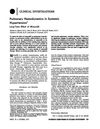 September 2002 in “Fertility and sterility”
September 2002 in “Fertility and sterility” Female relatives of PCOS patients have a higher chance of showing PCOS symptoms.
 5 citations,
February 2004 in “The New England Journal of Medicine”
5 citations,
February 2004 in “The New England Journal of Medicine” The book provides updated knowledge on hair disorders and new treatments for hair loss.
 6 citations,
October 1979 in “Chest”
6 citations,
October 1979 in “Chest” Minoxidil lowers blood pressure without worsening lung pressure but can cause increased hair growth.
 23 citations,
March 1994 in “Fertility and sterility”
23 citations,
March 1994 in “Fertility and sterility” Most patients improved with oral contraceptives, but some needed additional treatment.
 130 citations,
September 1990 in “Journal of the American Academy of Dermatology”
130 citations,
September 1990 in “Journal of the American Academy of Dermatology” Flutamide effectively reduced excessive hair growth and improved related symptoms in hirsutism patients without significant side effects.
 402 citations,
August 2011 in “Cancer research”
402 citations,
August 2011 in “Cancer research” Prostate cancer cells can make their own androgens to activate the androgen receptor, and treatments like abiraterone may increase this ability, suggesting new therapies should target the entire steroid-making pathway.
 39 citations,
March 2009 in “Archives of Dermatological Research”
39 citations,
March 2009 in “Archives of Dermatological Research” Apigenin may help promote hair growth and could treat hair loss.
 109 citations,
July 1984 in “Circulation”
109 citations,
July 1984 in “Circulation” Minoxidil helps heart function but doesn't improve exercise ability and may cause complications.
 72 citations,
January 2003 in “American Journal of Pathology”
72 citations,
January 2003 in “American Journal of Pathology” A protein called CBP is found in prostate cancer and can increase the effectiveness of certain prostate cancer treatments.
 166 citations,
March 2007 in “Hypertension”
166 citations,
March 2007 in “Hypertension” High androgen levels in young women with PCOS are linked to higher blood pressure.
 10 citations,
August 2012 in “Clinical Pharmacokinectics”
10 citations,
August 2012 in “Clinical Pharmacokinectics” Type 2 diabetes does not change how metformin works in obese pregnant women, so dosage adjustments are not needed.
 20 citations,
June 2016 in “Magnesium research”
20 citations,
June 2016 in “Magnesium research” Hair follicles help magnesium get through the skin more effectively.
 49 citations,
November 2019 in “Egyptian Journal of Medical Human Genetics”
49 citations,
November 2019 in “Egyptian Journal of Medical Human Genetics” Certain gene variants may contribute to high androgen levels in women with polycystic ovary syndrome.
 81 citations,
May 2007 in “Fertility and Sterility”
81 citations,
May 2007 in “Fertility and Sterility” Testosterone therapy seems safe for postmenopausal women for a few years, but more research is needed for long-term effects.
 6 citations,
August 2006 in “Journal of Cutaneous Pathology”
6 citations,
August 2006 in “Journal of Cutaneous Pathology” Two teenage brothers had a rare, treatment-resistant form of female-pattern hair loss with unusual scalp changes.
 55 citations,
September 2017 in “Expert Opinion on Drug Discovery”
55 citations,
September 2017 in “Expert Opinion on Drug Discovery” Different factors affect where drugs are absorbed in the small intestine, which is important for effective medication use.
 1 citations,
January 1996 in “Gynecological endocrinology”
1 citations,
January 1996 in “Gynecological endocrinology” Non-invasive imaging helped diagnose a woman's severe hormone imbalance and diabetes, and medication successfully treated her condition.
 August 1994 in “Drugs & Therapy Perspectives”
August 1994 in “Drugs & Therapy Perspectives” The document concludes that H2-antagonists and proton pump inhibitors are highly effective for ulcers, eradicating Helicobacter pylori is important to prevent recurrence, and misoprostol helps with NSAID-related ulcers.
 24 citations,
May 2010 in “Hautarzt”
24 citations,
May 2010 in “Hautarzt” Different hormones affect hair growth and conditions, with some causing hair loss and others promoting it.
 21 citations,
May 1989 in “Advanced Drug Delivery Reviews”
21 citations,
May 1989 in “Advanced Drug Delivery Reviews” Liposomes show promise in cancer treatment by delivering drugs with less toxicity and improved effectiveness.
 11 citations,
July 2001 in “APMIS. Acta pathologica, microbiologica et immunologica Scandinavica./APMIS”
11 citations,
July 2001 in “APMIS. Acta pathologica, microbiologica et immunologica Scandinavica./APMIS” Estrogens are key for bone growth spurts in both boys and girls and affect growth into adulthood.
 18 citations,
January 2003 in “Gynecological Endocrinology”
18 citations,
January 2003 in “Gynecological Endocrinology” Low-dose finasteride effectively reduces hirsutism without serious side-effects.
 15 citations,
March 2013 in “Pharmaceutical nanotechnology”
15 citations,
March 2013 in “Pharmaceutical nanotechnology” Finasteride delivery through skin improved using invasomes and iontophoresis.
 January 2015 in “Endocrine updates”
January 2015 in “Endocrine updates” Bariatric surgery patients need careful before and after surgery care for safety and long-term health.
 11 citations,
August 2013 in “Facial Plastic Surgery Clinics of North America”
11 citations,
August 2013 in “Facial Plastic Surgery Clinics of North America” New cell-based therapies may improve hair loss treatments in the future.
 68 citations,
November 2011 in “The American journal of pathology”
68 citations,
November 2011 in “The American journal of pathology” Abnormal Hedgehog signaling in blood cancers may help tumors grow and resist chemotherapy, suggesting potential for targeted treatments.
 May 2017 in “American Society of Health-System Pharmacists eBooks”
May 2017 in “American Society of Health-System Pharmacists eBooks”  207 citations,
April 2006 in “Journal of The American Academy of Dermatology”
207 citations,
April 2006 in “Journal of The American Academy of Dermatology” Iron deficiency may be related to hair loss, but there's not enough evidence to recommend iron screening or supplements for all hair loss patients.
 77 citations,
January 1989 in “Clinical Infectious Diseases”
77 citations,
January 1989 in “Clinical Infectious Diseases” Toxic Shock Syndrome progresses quickly, often involves multiple organs, and is linked to Staphylococcus aureus toxins, with treatment options available but diagnostic challenges remaining.
 34 citations,
January 1977 in “American Journal of Cardiology”
34 citations,
January 1977 in “American Journal of Cardiology”






























